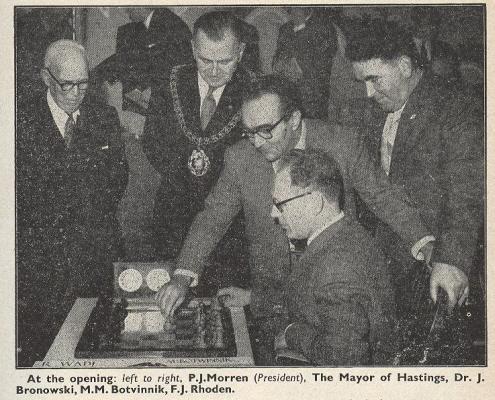
Edward Winter
A photograph of Jacob Bronowski opening the Hastings, 1961-62 event appeared on page 119 of the mid-January 1962 issue of CHESS:

The next page reported:
‘Dr Bronowski, opening the congress, disclosed that he had played chess all his life “with pleasure and passion” and considered himself fortunate to have lived through the most tremendous half century in the development of the game. It was just 50 years since the public had suddenly become excited about chess: it began with the great San Sebastián tournament of 1911, when Capablanca first sprung to fame.
At the age of 14 Dr Bronowski learned chess and was taken by his father to a simultaneous exhibition by the then boy prodigy Reshevsky. When he entered the room, he was taken for Reshevsky and got a round of undeserved applause. In 1945 he had played for the Civil Service against a scratch team and found himself faced by a young boy in knickerbockers who had signed his score-sheet “Jonathan Penrose”.’
(4965)
The quote below, from an obituary of Sir Maurice Kendall, comes from Morgan Daniels (London):
‘Life at St John’s was in striking contrast to that in Derby, and Maurice’s naturally gregarious nature brought him several circles of friends apart from the group reading Mathematics at St John’s: he played cricket for his college (and indeed was still a useful medium-paced bowler 25 years later); and he might have got a half-blue at chess had the company been less select – C.H.O’D. Alexander, later twice British champion, was one, and Jacob Bronowski another. Typically, Maurice enjoyed playing chess blindfold, and Bronowski and he played “negative chess”, where the previous moves had to be deduced from a set position.’
Source: A. Stuart, ‘Sir Maurice Kendall, 1907-1983’ in the Journal of the Royal Statistical Society. Series A (General), Volume 147, Number 1 (1984), page 121.
Paul Timson (Whalley, England) notes that Bronowski represented Cambridge University on board three against Oxford University in 1931, losing to E.S. Bensinger. See, for instance, page 357 of A Century of British Chess by Philip W. Sergeant (London, 1934). In the report on pages 157-158 of the April 1931 BCM the encounter was described as follows:
‘The third-board game raised Oxford’s hopes, Bensinger gaining a meritorious victory over Bronowski, winning a rook after having, apparently at least, had a ticklish position when the short middlegame commenced.’
From page 277 of the June 1936 BCM:
‘The Yorkshire individual championship has been won by J. Bronowski, of Hull. ... Dr Bronowski is assistant lecturer in mathematics at the University College, Hull, and is also an M.A., Ph.D. of Cambridge. He is 28 years of age. He has lived in Poland, Germany, France and Spain, and had been in Hull for one year when he won the club championship, which he has now followed by winning the county championship as well.’
A game from the London Commercial League was given (with notes by Bronowski) on pages 119-120 of the April 1963 BCM:
Jacob Bronowski – E.W. Harrison1 Nf3 Nf6 2 c4 d6 3 b3 e5 4 Bb2 Bg4 5 h3 Bh5 6 g4 Bg6 7 Bg2 Nc6 8 Nc3 Be7 9 d3 Qd7 10 Qd2 O-O-O 11 Nd5 Nxd5 12 cxd5 Nb8 13 Qe3 a6 14 Rc1 Qb5 15 O-O f5 16 gxf5 Bxf5
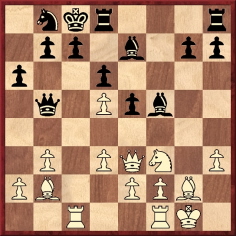
17 Nxe5 dxe5 18 Qxe5 Qd7 19 Rxc7+ Qxc7 20 Rc1 Nc6 21 Qxf5+ Qd7 22 Qxd7+ Kxd7 23 dxc6+ bxc6 24 Rxc6 a5 25 Ra6 Rc8 26 Ra7+ Rc7 27 Rxc7+ Kxc7 28 Bd5 Rd8 29 e4 g6 30 f4 Rf8 31 Kg2 Kd7 32 Kg3 Bb4 33 Bg7 Rc8 34 Bc4 Bd2 35 d4 Bc3 36 e5 Ke8 37 d5 Rd8 38 Bf6 Rb8 39 d6 Resigns.
Below is a list of problems by Bronowski that we have noted in the BCM:
The first of these:
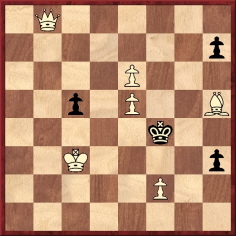
Mate in three.
(4971)
See too page 22 of the October 1928 Chess Amateur.
Michael McDowell (Westcliff-on-sea, England) notes that a few more problems by Bronowski can be found at the Chess Problem Database Server website by entering in the search box the following reference: a = 'bronowski'
Paul Buswell (Hastings, England) mentions that a Bronowski Trophy is still played for in London.
(4975)
Morgan Daniels quotes from pages 80 and 82 of Bronowski’s book The Ascent of Man (London, 1973):
‘In a sense, warfare was created by the horse, as a nomad activity. That is what the Huns brought, that is what the Phrygians brought, that is what finally the Mongols brought, and brought to a climax under Genghis Khan much later. In particular, the mobile hordes transformed the organization of battle. They conceived a different strategy of war – a strategy that is like a war game; how warmakers love to play games!
The strategy of the mobile horde depends on manoeuvre, on rapid communication, and on practised tactical moves which can be strung together into different sequences of surprise. The remnants of that remain in the war games that are still played and that come from Asia, such as chess and polo. War strategy is always regarded by those who win as a kind of game.’
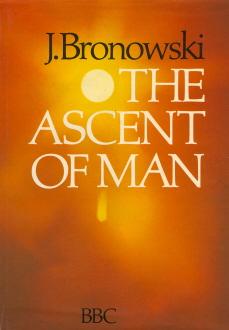
(4998)
Pages 182-183 of The Fry Chronicles by Stephen Fry (London, 2010) relate a conversation with Alistair Cooke during a dinner at Trinity Hall, Cambridge in 1981. Cooke ...
‘... talked wonderfully of his time at Jesus College in the late twenties and early thirties. He spoke of Jacob Bronowski, who had the rooms above him. “He invited me to a game of chess and as we sat down asked me, ‘Do you play classical chess or hypermodern?’”’
(6839)
C.N. 177 criticized a Bronowski tribute article by Harry Golombek on pages 441-443 of the December 1974 BCM on the grounds that Golombek wrote at length about himself. He did the same in an article also supposedly about Bronowski, ‘Master and man’, on page 13 of The Times, 5 October 1974.
From C.N. 177:
In 1974 the BCM was the victim of a cruel hoax when it published what purported to be an obituary of Dr Jacob Bronowski (pages 441-443). The writer, not the first name that would come to mind in the humility stakes, decided to abandon the tiresome conventions of obituaries and write about himself. There can never have been an obituary where the personal pronoun ‘I’ was used more often or with more insensitivity. It is a desperate shame that Harry Golombek, who gained an OBE for his services to chess (and, believe it or not, he even dragged that fact into poor Dr Bronowski’s death-notice), should be afflicted with two self-promoting vices: egocentricity and logorrhoea.
C.N. 11557 referred to Golombek’s ‘semi-autobiographical obituary of Jacob Bronowski’ in the BCM.
The problem below was published by C.H.O’D. Alexander in his chess column on page 40 of the Sunday Times magazine, 29 May 1966 under the heading ‘Specially contributed by Dr J. Bronowski (La Jolla, California)’:
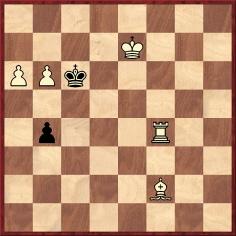
Mate in three.
From page 5 of the Daily Mail, 28 December 1961:

No report on the contents of the envelope has yet been found.
The game North v Bronowski, Yorkshire championship, 1936 was published by K.J. O’Connell on pages 298-299 of the July 1977 BCM, quoting from the Yorkshire Chess Association Bulletin:
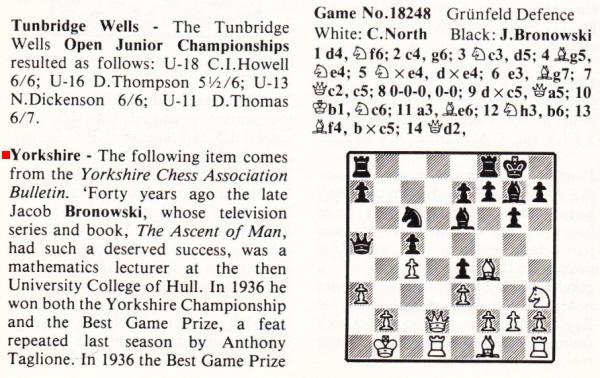

A number of compositions have been listed on which Bronowski collaborated with Norman Martin Gibbins, and Steven B. Dowd (Birmingham, AL, USA) points out a website offering information about Gibbins.
We add that a brief illustration of Bronowski’s play was published on page 15 of volume two of Learn Chess: A New Way for All by C.H.O’D. Alexander and T.J. Beach (Oxford, 1963):
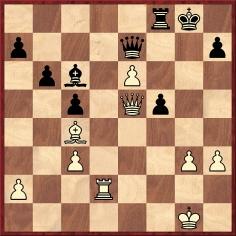
The solution on page 185:

In the algebraic edition (Oxford, 1987), the page numbers are 13 and 156.
From W. Ritson Morry’s report about Hastings, 1961-62 on pages 33-34 of the February 1962 BCM:
‘The congress was opened, after the Mayor (Alderman G. [sic – C.] Barfoot, JP) had welcomed the competitors, by a chessplayer of no mean skill in the person of Dr J. Bronowski, who discarded most of the usual platitudes in favour of a really amusing account of his own chess career, which proceeded rather on the lines of the applicant for the Indian Civil Service who had “failed entrance examination Allahabad University 1922”. The good doctor had managed to lose to almost every grandmaster in the room and quite a few more, some of them when they were of very tender years, such as Sammy Reshevsky when a boy prodigy (for whom he was momentarily mistaken at a display and given a big round of applause), and Johnny Penrose way back in 1945. It was all excellent fun, and when someone accidentally “crowned” chairman Percy Morren [the President of the Hastings Chess Club] with a demonstration board the large crowd’s day was really complete.’
(8280)
Two more games have been found by Alan Smith (Stockport, England):
Jacob Bronowski – Arnold Yorwarth Green
Yorkshire Championship (final), 1935-36
Queen’s Gambit Declined
1 d4 d5 2 c4 c6 3 Nf3 Nf6 4 Nc3 Bf5 5 cxd5 cxd5 6 Qb3 Qb6 7 Nxd5 Qxb3 8 Nxf6+ exf6 9 axb3 Nc6 10 e3 Nb4 11 Bb5+ Kd8 12 O-O Nc2
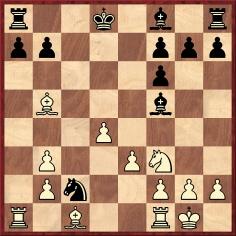
13 Ra4 Bd6 14 Bd2 Ke7 15 Rc1 a6 16 Be2 b5 17 Ra5 Rhc8 18 Bd1 Bb4 19 Bxc2 Bxd2 20 Nxd2 Bxc2 21 f3 Bd3 22 Raa1 f5 23 b4 h5 24 Rc5 Kd6 25 Rac1 Rxc5 26 bxc5+ Kd5 27 Rc3 Bc4 28 b3 Be2 29 Kf2 b4 30 Rc1 Bd3 31 Nc4 Bxc4 32 Rxc4 a5 33 Rc2 a4 34 bxa4 b3 35 Rc3 Rb8 36 Rc1 f4 37 Rb1 b2 38 a5 Kc4 39 c6 fxe3+ 40 Kxe3 Kc3 41 d5 Resigns.
Source: Staffordshire Advertiser, 6 June 1936.
Jacob Bronowski – Reginald Joseph Broadbent
Hull v Bradford match, Hull, 21 January 1939
Dutch Defence
1 d4 e6 2 Nf3 f5 3 g3 Nf6 4 Bg2 Be7 5 O-O O-O 6 b3 d5 7 Ne5 b6 8 Bb2 Bb7 9 Nc3 Nbd7 10 e3 c5 11 Ne2 Bd6 12 Nf4 Qe7 13 c4 Rad8 14 cxd5 exd5 15 Nxd7 Qxd7 16 dxc5 Bxf4 17 c6 Bxc6 18 gxf4 Ne4 19 Rc1 Qe6 20 Qd4 Rf6 21 f3 Nc5
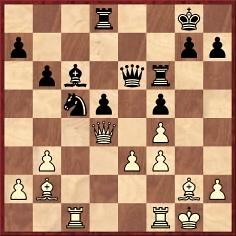
22 e4 Rg6 23 b4 Na4 24 exf5 Qxf5 25 Rxc6 Nxb2 26 Rxg6 hxg6 27 Qxb2 Resigns.
Source: Observer, 5 February 1939, page 21.
(8302)
A further problem, composed by J. Bronowski and N.M. Gibbins, from page 19 of the Observer, 5 November 1933:
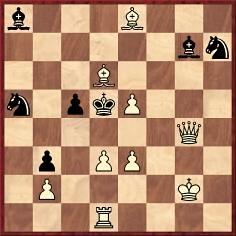
Mate in two
Gerard Killoran (Ilkley, England) points out a passage about Jacob Bronowski on page 34 of Snapshots. Encounters With Twentieth-Century Legends by Herbert Kretzmer (London, 2014):
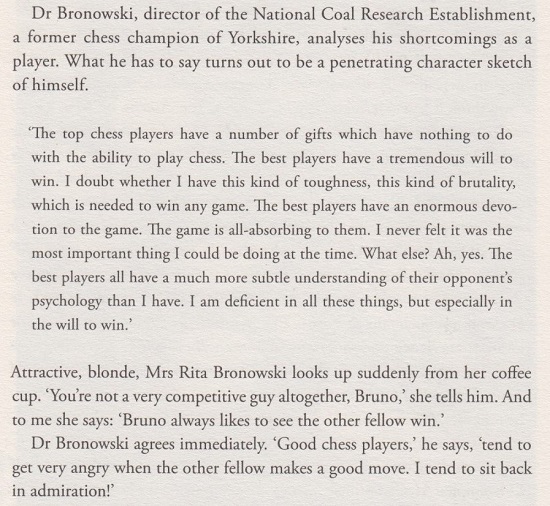
(9248)
Alan Smith (Stockport, England) points out two further games:
Jacob Bronowski (Cambridge) – William Henry Watts
(Athenaeum)
Cambridge, 1931
King’s Indian Defence
1 d4 e6 2 c4 Nf6 3 Nc3 Bb4 4 Qc2 d5 5 e3 O-O 6 Nf3 Nbd7 7 Bd2 Re8 8 a3 Bf8 9 Bd3 c5 10 Ng5 g6 11 f4 dxc4 12 Bxc4 cxd4 13 exd4 Nb6 14 Bd3 Qxd4 15 Nb5 Qd5 16 Nc7 Qxg2 17 O-O-O Bd7 18 Nxe8 Rxe8 19 Rdg1 Qc6 20 Bc3 Nfd5
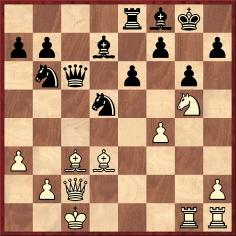
21 Nxh7 Nxc3 22 Nf6+ Kh8 23 Nxe8 Bxe8 24 bxc3 Bxa3+ 25 Kd2 Qf3 26 Rf1 Qd5 27 c4 Qa5+ 28 Qc3+ Qxc3+ 29 Kxc3 Bc6 30 Rhg1 Resigns.
Source: Observer, 15 November 1931, page 23.
Jacob Bronowski – Laurence Chisholm Young
Cambridge, 1931 (University Championship)
Nimzo-Indian Defence
1 d4 Nf6 2 c4 g6 3 Nc3 Bg7 4 e4 d6 5 Bg5 Nc6 6 h3 Nh5 7 g4 h6 8 Be3 Nf6 9 f4 e6 10 Nf3 Nd7 11 e5 b6 12 d5 Na5 13 exd6 exd5 14 Nxd5 cxd6 15 Bd4 O-O 16 Bxg7 Re8+ 17 Be2 Kxg7 18 f5 Nxc4 19 Qd4+ Nce5 20 Rc1 Kh7 21 fxg6+ fxg6 22 O-O Nc5 23 Qf4 g5 24 Nf6+ Kg6
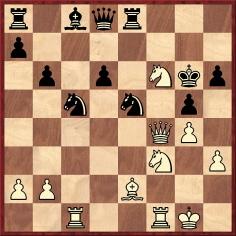
25 Nh4+ gxh4 26 Rxc5 dxc5 27 Qe4+ Kf7 28 Nxe8+ Kxe8 29 Qxe5+ Qe7 30 Bb5+ Resigns.
Source: Observer, 20 December 1931, page 16.
Alan Smith has forwarded these additional games:
Arnold Yorwarth Green – Jacob Bronowski
Sheffield v Hull match, Goole, 16 March 1935
Nimzo-Indian Defence
1 d4 Nf6 2 c4 e6 3 Nc3 Bb4 4 Nf3 c5 5 e3 Ne4 6 Qc2 d5 7 Bd3 Qa5 8 O-O Bxc3 9 bxc3 Nf6 10 Ne5 Nbd7 11 f4 dxc4 12 Nxc4 Qc7 13 e4 b5 14 Na3 c4 15 Nxb5 Qc6 16 Bxc4 a6 17 Na3 Qxe4 18 Bd3 Qc6 19 Nc4 O-O 20 Ne5 Qc7 21 Rf3 Bb7 22 Rh3 h6 23 Rb1 Rfd8 24 g4 Nxe5 25 fxe5 Nxg4 26 Rg3 h5 27 h3 Qc6 28 Rxb7 Qxb7 29 Be4 Qe7 30 Bxa8 Rxa8 31 hxg4 h4 32 Rh3 Rf8 33 g5 g6 34 Rxh4 Resigns.
Source: Yorkshire Telegraph and Star, 8 June 1935
Rev. G.C. Beach – Jacob Bronowski
Yorkshire championship, 19 October 1935
Irregular Opening
1 Nf3 Nf6 2 c4 g6 3 b3 Bg7 4 Bb2 O-O 5 g3 e6 6 Bg2 d5 7 Na3 Qe7 8 O-O Rd8 9 Nc2 c5 10 cxd5 Rxd5 11 Ne3 Rd8 12 Qc2 b6 13 Rad1 Bb7 14 h3 Nc6 15 d4 Nb4 16 Qb1 Be4 17 Qa1 Nfd5 18 Nxd5 exd5 19 e3 Bd3 20 a3 Bxf1 21 axb4 Bxg2 22 Kxg2 cxb4 23 Qa6 Rd6 24 Nd2 Rc6 25 Qb5 Rc2 26 Ba1 Qd6 27 e4 dxe4 28 Nxe4 Qe7 29 Qd3 Rac8 30 d5 Bxa1 31 Rxa1 f5 32 Re1 fxe4 33 Rxe4 Qc5 34 Rf4 Rd8 35 Qf3 Rxd5 36 Rf8+ Qxf8 37 Qxd5+ Qf7 38 Qd8+ Kg7 39 Qd4+ Qf6 40 White resigns.
Source: Scrapbook of Rev. Beach, page 14.
Jacob Bronowski – Rev. G.C. Beach
Hull v York match, York, 14 March 1936 (board one)
Sicilian Defence
1 e4 c5 2 Nf3 Nf6 3 Nc3 d5 4 e5 d4 5 exf6 dxc3 6 fxg7 cxd2+ 7 Bxd2 Bxg7 8 Bc4 Qd6 9 Ng5 Qe5+ 10 Be3 e6 11 Qh5 Rf8 12 O-O h6 13 Rfe1 hxg5 14 Bxg5 Rh8 15 Qg4 Qxh2+ 16 Kf1 Qh1+ 17 Ke2 Qh5 18 Qxh5 Rxh5 19 Be3 b6 20 c3 Ba6 21 Bxa6 Nxa6 22 g4 Rh7 23 f4 O-O-O 24 a3 Nc7 25 Rh1 Rdh8 26 Rxh7 Rxh7 27 Bf2 Rh2 28 Kf3 Bf6 29 Kg3 Rh7 30 g5 Be7 31 Rd1 Ne8 32 Kg4 Nd6 33 b4 Ne4 34 Be1 Rh1 35 White resigns.
Source: Scrapbook of Rev. Beach, page 58 (undated column in the York Chronicle).
Jacob Bronowski – F. Ashford Eve
Yorkshire v Lancashire match, Leeds, 21 March 1936
Queen’s Gambit Declined
1 d4 d5 2 c4 e6 3 Nc3 Nf6 4 Bg5 Nbd7 5 e3 Be7 6 Nf3 O-O 7 Rc1 c6 8 Bd3 dxc4 9 Bxc4 Nb6 10 Bd3 Nfd5 11 Bxe7 Qxe7 12 O-O Bd7 13 Ne4 Rad8 14 a3 Bc8 15 Qc2 h6 16 Kh1 Nd7 17 g4 f5 18 gxf5 Rxf5 19 Ned2 Rf6 20 Nh4 Nf8 21 Ndf3 Qf7 22 Ne5 Qh5 23 Nhg6 Bd7 24 Be2 Qh3 25 Bg4 Nxe3 26 Bxh3 Nxc2 27 Nxf8 Kxf8 28 Rxc2 Resigns.
Source: Yorkshire Telegraph and Star, 8 August 1936.
Reference has been made (see above) to Harry Golombek’s self-centred ‘tribute articles’ on page 13 of the Times, 5 October 1974 and pages 441-443 of the December 1974 BCM. An episode related in both publications dates from the late 1920s:
‘... on holiday at a seaside resort on the southern coast I had a number of conversations with a worried looking gentleman in my boarding house while the rain was falling. This was Bronowski’s father, and the reason why he was worried was that he was full of forebodings about his son’s tendency to dissipate his undoubted gifts on what seemed to him mere side-issues. He was writing poetry and, as for chess, he was giving too much time to chess problems. “A waste of time”, I commented in the full certainty of my 17 years. “Yes”, said Bronowski père, “that’s what I’m always telling him.”’ (Times)
‘... he asked for my advice about his son. He was at Cambridge University and, according to the father, dissipating his undoubted talents in all sorts of unrewarding side-issues. He was even writing poetry and as for chess, he had recently taken up problem composing instead of the more solid pursuit of actually playing chess. What, he asked, did I think of chess problems. “A waste of time”, I replied. Before there are howls of protest, let me add that I have learnt better now. I consider problems just as much, or as little, waste of time as playing chess, going in for politics or religion, practising the law or train-spotting, negotiating to enter or leave the EEC or just simply, like Candide, cultivating one’s garden. Anyway, my reply appealed to Bronowski père, who said, “That’s what I’m always telling him.”’ (BCM)
Golombek’s writings throughout his life showed little interest in chess compositions.
(9993)
When Jacob Bronowski was the guest on the BBC Radio 4 programme Desert Island Discs (an episode first broadcast on 5 January 1974), he chose as his luxury item an antique chess set and, as his book, an unnamed volume on the 1972 Spassky v Fischer match. The relevant sequence begins at about 26’00” in the archived version on the BBC website.
Olimpiu G. Urcan (Singapore) has sent us a 1973 photograph of Dr Bronowski which is shown here courtesy of Timelapse Library Ltd/Getty Images:

To the Chess Notes main page.
To the Archives for other feature articles.
Copyright: Edward Winter. All rights reserved.